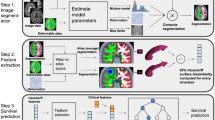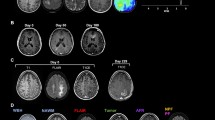Abstract
We present a novel manifold learning approach to efficiently identify low-dimensional structures, known as manifolds, embedded in large-scale, high dimensional MRI datasets for brain tumor growth prediction. The datasets consist of a series of MRI scans for three patients with tumor and progressed regions identified. We attempt to identify low dimensional manifolds for tumor, progressed and normal tissues, and most importantly, to verify if the progression manifold exists - the bridge between tumor and normal manifolds. By mapping the bridge manifold back to MRI image space, this method has the potential to predict tumor progression, thereby, greatly benefiting patient management. Preliminary results supported our hypothesis: normal and tumor manifolds are well separated in a low dimensional space and the progressed manifold is found to lie roughly between them but closer to the tumor manifold.
Access this chapter
Tax calculation will be finalised at checkout
Purchases are for personal use only
Preview
Unable to display preview. Download preview PDF.
Similar content being viewed by others
References
Pauleit, D., Langen, K.J., et al.: Can the Apparent Diffusion Coefficient be Used as A Noninvasive Parameter to Distinguish Tumor Tissue from Peritumoral Tissue in Cerebral Gliomas? J. Magn. Reson. Imaging (20), 758–764 (2004)
Bode, M.K., Ruohonen, J., et al.: Potential of Diffusion Imaging in Brain Tumors: A Review. Acta Radiol. (47), 585–594 (2006)
Deshpande, A., Rademacher, L., et al.: Matrix approximation and projective clustering via Volume Sampling. In: Symposium on Discrete Algorithms, vol. (2), pp. 225–247 (2006)
Drineas, P., Mahomey, M.W.: On the Nystrom Method for Approximating a Gram Matrix for Improved Kernel-Based Learning. JMLR (6), 2153–2175 (2005)
Wang, S., Yao, J., et al.: Improved classifier for computer-aided polyp detection in CT colonography by nonlinear dimensionality reduction. Med. Phys. 35(4), 1377–1386 (2008)
Silva, V., Tenenbaum, J.B.: Global Versus Local Methods in Nonlinear Dimensionality Reduction. In: NIPS, vol. 15, pp. 721–728 (2003)
Hatzikirou, H., Deutsch, A., et al.: Mathematical Modelling of Glioblastoma Tumor Developement: A Review. Mathematical Models and Methods in Applied Sciences 15(11), 1779–1794 (2005)
Murray, J.: Mathematical Biology. Springer, Heidelberg (1989)
Atuegwu, N.C., et al.: The integration of quantitative multi-modality imaging data into mathematical models of tumors. Physics in Medicine and Biology 55, 2429–2449 (2010)
Cobzas, D., Mosayebi, P., Murtha, A., Jagersand, M.: Tumor Invasion Margin on the Riemannian Space of Brain Fibers. In: Yang, G.-Z., Hawkes, D., Rueckert, D., Noble, A., Taylor, C. (eds.) MICCAI 2009. LNCS, vol. 5762, pp. 531–539. Springer, Heidelberg (2009)
Zhang, Z., et al.: Principal manifolds and nonlinear dimensionality reduction via local tangent space alignment. SIAM Journal of Scientific Computing 26(1), 313–338 (2004)
Roweis, S.T., Saul, L.K.: Nonlinear dimensionality reduction by locally linear embedding. Science 290(5500), 2323–2326 (2000)
Hartkens, T., Ruechert, D., et al.: VTK CISG Registration Toolkit: An open source software package for affine and non-rigid registration of single- and multimodal 3D images. In: Workshop Bildverarbeitung fur die Medizin, pp. 409–412 (2002)
Duda, R., Hart, P.: Pattern Classification and Scene Analysis, pp. 114–129 (1973)
Author information
Authors and Affiliations
Editor information
Editors and Affiliations
Rights and permissions
Copyright information
© 2011 Springer-Verlag Berlin Heidelberg
About this paper
Cite this paper
Tran, L. et al. (2011). A Large-Scale Manifold Learning Approach for Brain Tumor Progression Prediction. In: Suzuki, K., Wang, F., Shen, D., Yan, P. (eds) Machine Learning in Medical Imaging. MLMI 2011. Lecture Notes in Computer Science, vol 7009. Springer, Berlin, Heidelberg. https://doi.org/10.1007/978-3-642-24319-6_33
Download citation
DOI: https://doi.org/10.1007/978-3-642-24319-6_33
Publisher Name: Springer, Berlin, Heidelberg
Print ISBN: 978-3-642-24318-9
Online ISBN: 978-3-642-24319-6
eBook Packages: Computer ScienceComputer Science (R0)




